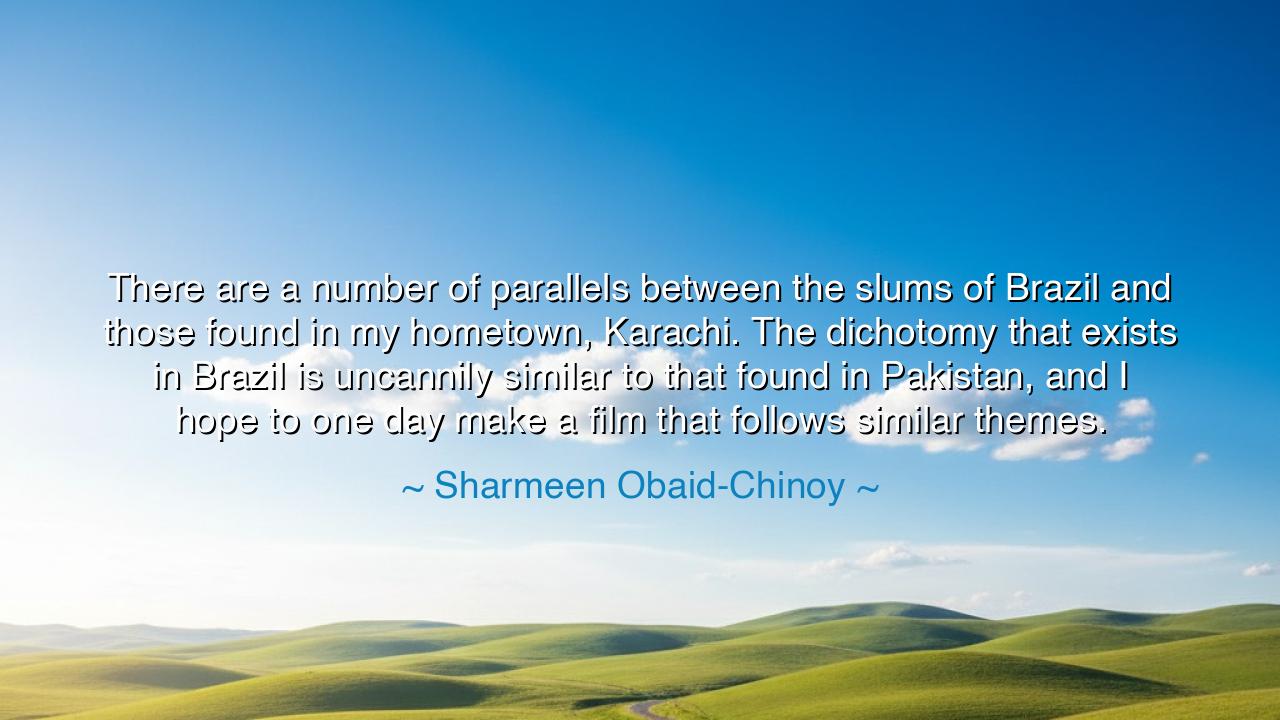
There are a number of parallels between the slums of Brazil and
There are a number of parallels between the slums of Brazil and those found in my hometown, Karachi. The dichotomy that exists in Brazil is uncannily similar to that found in Pakistan, and I hope to one day make a film that follows similar themes.






In the words of Sharmeen Obaid-Chinoy, the truth of two distant worlds converges: “There are a number of parallels between the slums of Brazil and those found in my hometown, Karachi. The dichotomy that exists in Brazil is uncannily similar to that found in Pakistan, and I hope to one day make a film that follows similar themes.” Beneath these words lies the voice of a seer, one who has gazed upon the twin faces of humanity—the gleaming towers of wealth and the forgotten streets of want. Hers is not the gaze of judgment, but of witnessing: a voice that calls upon us to see that the struggles of one land are mirrored in another, that injustice knows no borders, and that compassion, too, must transcend all frontiers.
When Obaid-Chinoy speaks of parallels, she speaks of a universal truth—the enduring division between privilege and poverty, between those who feast and those who hunger. The slums of Brazil, alive with color yet burdened by despair, reflect the same spirit as the streets of Karachi, where the forgotten laborers build the very cities that exclude them. This dichotomy—this cruel contrast—is not confined to continents; it is the wound of the modern world. To see it clearly, as she does, is to bear the burden of empathy—to feel the pulse of both sorrow and strength that beats within the lives of the poor.
In the ancient days, philosophers spoke of the “two cities” within every society: the city of gold and the city of dust. One glimmers under the sun, drunk with abundance; the other toils in shadow, unseen. Yet both are bound by the same destiny. When one rises too high upon the suffering of the other, both fall together. The wise have always known this: inequality, left unchecked, becomes a storm that consumes all. What Obaid-Chinoy recognizes in her travels, and what she seeks to reveal through film, is this ancient balance—how the fate of the powerful and the powerless are intertwined, and how art can serve as the mirror that forces the world to look upon itself.
The parallels she draws recall the story of Victor Hugo, who in Les Misérables revealed the misery of France’s forgotten poor to a nation that had chosen blindness. Through his art, the suffering of the streets entered the hearts of kings. In the same spirit, Obaid-Chinoy, a daughter of Pakistan, wields her camera not as a weapon, but as a lamp—illuminating the corners where the world’s light has not reached. By linking Karachi to Brazil, she declares that human pain is not isolated by geography; the same inequity, the same yearning for dignity, dwells in every city, in every age.
And yet, within these slums—these so-called places of despair—there is also resilience. Children play among the ruins; mothers sing songs of hope; neighbors share what little they have. There is beauty even in struggle, and strength even in suffering. This is what the artist sees: that from the dust, greatness can rise. The favelas of Brazil have given birth to poets, musicians, and revolutionaries; the alleys of Karachi have birthed thinkers, dreamers, and reformers. The human spirit, though pressed down by circumstance, rises like grass through stone.
Obaid-Chinoy’s wish “to one day make a film that follows similar themes” is more than a filmmaker’s ambition—it is a vow of solidarity, a call to see beyond borders, to recognize that all humanity shares one heartbeat. In a time when nations build walls and hearts grow cold, her vision reminds us that art can bridge the chasm of indifference. Through the power of storytelling, she seeks not only to show poverty, but to awaken conscience, to remind the world that dignity belongs to every soul.
So, my child of tomorrow, take this lesson to heart: see the parallels. When you look upon another’s suffering, do not think, “That is not my story.” For every injustice that exists in one place is the shadow of what could rise in another. The boundaries that divide nations are illusions; the truths that unite humanity are eternal. Act with empathy, live with awareness, and lend your voice to the voiceless. For as Sharmeen Obaid-Chinoy teaches, to witness truth and remain silent is to become part of the blindness that sustains suffering.
Therefore, let your life be your own film—a story that reveals, not hides; that connects, not separates. Walk among the cities of gold and the cities of dust, and let your heart be a bridge between them. For only when the world learns to see itself as one can the long shadow of inequality finally begin to fade.






AAdministratorAdministrator
Welcome, honored guests. Please leave a comment, we will respond soon